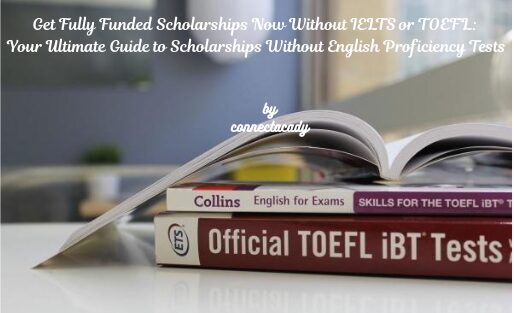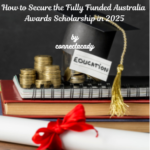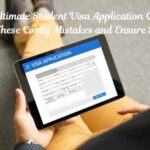Have you been putting off applying for scholarships because you’re worried about not having the right IELTS or TOEFL scores? You’re not alone! For many students, the requirement for English proficiency tests like IELTS and TOEFL is a significant roadblock. But here’s the good news: fully funded scholarships without IELTS or TOEFL are available, and you can access them.

In this guide, we’ll explore how you can secure scholarships without worrying about standardized language exams. By the end of this post, you’ll have a solid understanding of how to navigate this process and increase your chances of receiving funding for your international education.
Why IELTS and TOEFL Are a Barrier for Many Students
The Financial Burden of IELTS and TOEFL Exams
For many international students, the costs associated with taking IELTS or TOEFL exams are significant. Exam fees typically range from $150 to $250, and this doesn’t include the costs of preparatory courses, study materials, or retaking the exam if necessary. For students from lower-income families, these fees can be prohibitive, making it challenging to pursue higher education abroad.
The Time Investment and Stress of Preparing for English Proficiency Tests
In addition to the financial costs, preparing for these exams requires a considerable time investment. Students must commit hours to studying for reading, writing, listening, and speaking sections, often while juggling their academic responsibilities. The pressure to perform well on these high-stakes exams can also cause significant stress and anxiety, further hindering students’ ability to succeed.
The Psychological Impact of Standardized Testing
Standardized testing, including IELTS and TOEFL, can be mentally taxing. The rigid structure and timed nature of these exams create a high-stakes environment that can induce anxiety, particularly for non-native English speakers. This often leads to test fatigue, making it even harder to focus on other aspects of the scholarship application process.
Alternative Ways to Prove Your English Proficiency
Interview or Video Assessment as an Alternative
Many universities now allow applicants to prove their English proficiency through interviews or video assessments. These methods give students a chance to showcase their communication skills in a less stressful and more personalized environment. By engaging in a direct conversation with admissions officers or faculty members, students can demonstrate their language skills more naturally.
Prior Education in English-Speaking Countries
Some universities accept proof of prior education in English-speaking countries as an alternative to standardized language exams. If you have completed high school or university education in a country where English is the primary language of instruction, you may not need to take IELTS or TOEFL.
Language Proficiency Certificates from Other Sources
Several institutions offer their own language proficiency assessments or accept certificates from other language courses or tests. For example, some universities might accept results from a Cambridge English exam or other approved programs. Be sure to inquire with the institution to find out what alternatives are available.
Scholarships That Do Not Require IELTS or TOEFL
There are numerous fully funded scholarships without IELTS or TOEFL that allow you to pursue your academic goals abroad without the stress of standardized English proficiency tests. Let’s take a closer look at some of the best opportunities available in the United States, Europe, and Asia.
Scholarships in the United States

- The United World Colleges (UWC) Scholarships
UWC offers scholarships to students from all over the world to study in their prestigious programs. The best part? You don’t need IELTS or TOEFL scores to apply. UWC assesses your English proficiency through other means, such as interviews and academic records. This is a great option if you want a fully funded scholarship in the United States without worrying about language tests. - The Fulbright Scholarship
One of the most well-known scholarship programs globally, the Fulbright Scholarship also provides opportunities for students without IELTS or TOEFL scores. Depending on your country of origin, Fulbright may waive English proficiency requirements if your academic background or experience demonstrates sufficient language skills.
Scholarships in Europe
- The Erasmus Mundus Scholarship
Erasmus Mundus is a fantastic European Union scholarship program that offers fully funded opportunities to students across the globe. Many of the partner universities in the Erasmus program do not require IELTS or TOEFL for admission. They may accept alternatives such as proof of prior education in English-speaking institutions or an interview process to assess language proficiency. - The DAAD Scholarships
The German Academic Exchange Service (DAAD) offers scholarships to international students wishing to study in Germany. Many DAAD programs do not require IELTS or TOEFL scores, especially if you have a strong academic background or have studied in an English medium school. This is an excellent chance for those who are aiming for a fully funded scholarship in Europe.
Scholarships in Asia
- The Chinese Government Scholarship
The Chinese Government Scholarship offers international students the chance to study in China with a fully funded scholarship. English proficiency tests like IELTS or TOEFL are often not required, and you may be able to prove your language skills through alternative methods, such as an interview or previous English-medium education. - The Japan Monbukagakusho Scholarship
Japan’s Monbukagakusho Scholarship is another amazing opportunity that does not require IELTS or TOEFL scores. Many Japanese universities, including those offering this scholarship, allow alternative methods to assess English proficiency, such as interviews or academic documents.
How to Find Fully Funded Scholarships Without IELTS or TOEFL
There are fully funded scholarships without IELTS or TOEFL available, and finding them can be easier than you think. Here’s how you can search for these opportunities effectively.
Using Scholarship Search Engines
Scholarship search engines are powerful tools for finding opportunities that don’t require IELTS or TOEFL scores. These platforms allow you to filter scholarships based on your country, field of study, and specific requirements. Website like Scholarships.com, allow you to specifically search for scholarships that do not require English proficiency tests. Simply enter your preferences and explore a wealth of options available worldwide.
- Scholarships.com: Offers a variety of scholarships, including those without language test requirements.
Reaching Out to Universities Directly
Another effective strategy for finding fully funded scholarships without IELTS or TOEFL is by reaching out directly to universities. Many universities have begun waiving English proficiency test requirements, especially for applicants from countries where English is the primary language of instruction. By contacting the admissions office, you can inquire about alternative methods to demonstrate your English language skills, such as personal interviews, video assessments, or previous academic coursework in English.
- Direct communication with the admissions team provides clarity on specific language requirements.
- Universities may provide alternate methods for proving English proficiency, like an online interview.
Leveraging Scholarship Agencies
Scholarship agencies and consultants can significantly boost your chances of finding and applying for scholarships that do not require IELTS or TOEFL. These professionals are well-versed in navigating the scholarship landscape and often have access to exclusive opportunities. They can guide you through the process, helping you prepare the necessary documents, meet deadlines, and apply to suitable scholarships.
- Agencies have inside knowledge of scholarships that might not be widely advertised.
- They offer tailored advice based on your academic background and goals.

By utilizing scholarship search engines, reaching out to universities directly, and leveraging scholarship agencies, you can unlock a wide array of opportunities for fully funded scholarships without IELTS or TOEFL.
How to Prepare for Scholarships Without English Proficiency Tests
There are alternative ways to improve your English, meet application requirements, and craft a compelling scholarship application. Here’s how you can prepare for scholarships without English proficiency tests:
Improving Your English Without IELTS or TOEFL
While you may not need IELTS or TOEFL scores, improving your English is still important for your studies abroad. Here are some effective ways to boost your language skills:
- Engage in Daily Conversations: Join online English conversation groups or connect with native speakers through platforms like Tandem or HelloTalk.
- Watch English Content: Watch movies, TV shows, and documentaries in English to familiarize yourself with natural language use.
- Read English Books and Articles: Reading daily helps you improve vocabulary and comprehension. Try reading news articles, academic papers, or novels.
- Practice Listening and Speaking: Platforms like YouTube and podcasts can help improve your listening skills, while apps like Speechling can help you practice speaking.
Improving your English without IELTS or TOEFL is entirely possible with consistent practice. This will not only help you communicate effectively but also make your scholarship application stronger.
Essential Documents for Application
Even without IELTS or TOEFL, there are several important documents you need to submit to apply for a fully funded scholarship without IELTS or TOEFL:
- Transcripts and Certificates: Ensure you have your academic transcripts and any relevant certificates, such as a degree or diploma, ready for submission.
- Letters of Recommendation: Secure strong letters of recommendation from professors or mentors who can vouch for your academic abilities.
- Statement of Purpose (SOP): A well-written SOP is critical for your application. It should clearly explain why you’re applying for the scholarship, your goals, and how you align with the scholarship’s values.
These documents are vital for the scholarship application process, even if you’re exempt from English proficiency tests.
Writing a Winning Personal Statement and SOP
A personal statement and SOP can make a huge difference in your scholarship application. To write a winning one:
- Be Authentic: Share your personal story, highlighting your achievements, experiences, and how they’ve prepared you for this scholarship.
- Showcase Your Passion: Demonstrate your passion for the field of study and how receiving the scholarship will help you achieve your long-term goals.
- Highlight Your Strengths: Focus on your strengths and skills that make you stand out from other applicants, even if you don’t have IELTS or TOEFL scores.
By writing a compelling personal statement and SOP, you can enhance your chances of securing a scholarship without needing IELTS or TOEFL scores.
Tips for a Successful Scholarship Application
How to Stand Out from the Competition
When applying for fully funded scholarships without IELTS or TOEFL, the competition is fierce. To stand out, focus on showcasing your unique qualities and experiences. Emphasize achievements that align with the scholarship’s goals, and avoid generic statements. Highlight your passion, leadership skills, and how you can contribute to the global community. Consider including volunteer work, extracurricular activities, and academic projects that demonstrate your dedication and initiative.
Securing Strong Letters of Recommendation
A compelling letter of recommendation can set your application apart. Choose recommenders who truly know you and can speak to your strengths. These letters should not just praise your academic abilities but also your character, work ethic, and potential. Give your recommenders ample time to write a detailed, thoughtful letter, and provide them with relevant information to make their job easier. Strong, personalized letters of recommendation can make all the difference in winning fully funded scholarships without IELTS or TOEFL.
Meeting All Eligibility Criteria
Before submitting your scholarship application, carefully read through the eligibility criteria. Ensure you meet all requirements, from academic qualifications to any specific skills or experience. Submitting an application that doesn’t fully meet the criteria can lead to disqualification. It’s crucial to demonstrate that you’re a perfect fit for the scholarship, both in terms of academic potential and personal attributes. A well-prepared, complete application increases your chances of being considered for the scholarship.

Mistakes to Avoid When Applying for Scholarships
Ignoring the Fine Print in Scholarship Requirements
One common mistake students make is overlooking the fine print in the scholarship requirements. Make sure to read every detail and follow the instructions precisely. Failing to do so can result in your application being rejected, even if you are an excellent candidate. Pay attention to document formats, deadlines, and any additional materials required. A little attention to detail can greatly improve your chances of success.
Missing Application Deadlines
Deadlines are crucial, and missing them is one of the most common reasons applications are rejected. Create a timeline and start your application process well in advance. Make sure you submit all materials before the due date to avoid last-minute stress. Staying organized and punctual is key to securing fully funded scholarships without IELTS or TOEFL.
Submitting a Generic Personal Statement
Your personal statement is a powerful part of your scholarship application. Avoid submitting a generic essay that doesn’t reflect your individuality. Instead, craft a compelling narrative that showcases your goals, challenges, and aspirations. Be honest, specific, and passionate about why you are the right candidate for the scholarship. A personalized and engaging personal statement can help set you apart from other applicants.
Conclusion
By following the strategies outlined in this guide, you can open doors to a world of educational opportunities without the burden of IELTS or TOEFL. Fully funded scholarships without IELTS or TOEFL are accessible, and with the right approach, you can make your dream of studying abroad a reality. Start applying today, and don’t let language proficiency tests stand in your way!
Frequently Asked Questions
Can I apply for fully funded scholarships without IELTS or TOEFL? Yes, many scholarships do not require IELTS or TOEFL. Universities often offer alternative methods to assess English proficiency.
How do I prove my English proficiency if I don’t take IELTS or TOEFL? Alternatives include interviews, proof of prior education in English-speaking countries, or certificates from other recognized English language courses.
What are some common scholarships that do not require English proficiency tests? Examples include the United World Colleges (UWC) Scholarships, Erasmus Mundus, DAAD Scholarships, and the Chinese Government Scholarship.
Are scholarships available for undergraduate programs without IELTS or TOEFL? Yes, there are scholarships available for both undergraduate and graduate programs that do not require IELTS or TOEFL.
How can I make my application stand out for scholarships without IELTS or TOEFL? Tailor your personal statement to the scholarship, highlight your unique achievements, and ensure that all your application materials are carefully crafted.










